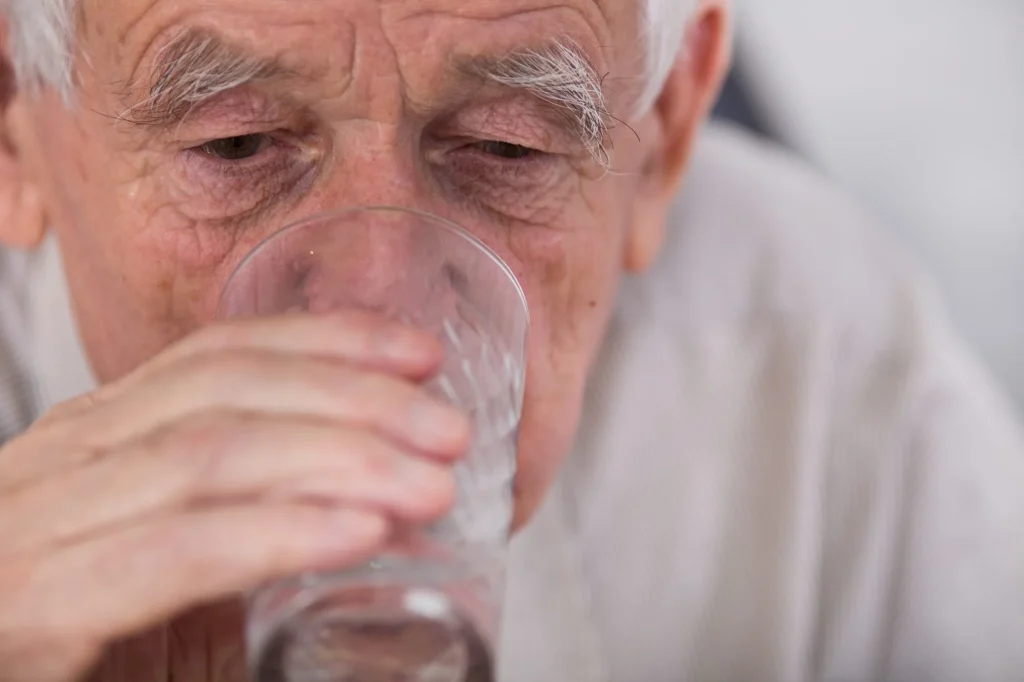
Dehydration in Elderly: Symptoms & Causes + How to Avoid
Many times, problems such as malnutrition in elderly are given more attention. This issue causes other sometimes dangerous problems such as the reduction of water level in the body of the elderly to be ignored. Dehydration in elderly is one of the most common problems that older people experience at this stage of their lives. This problem occurs when the body has lost a lot of fluids and seeks to compensate for it. Many researchers and doctors have considered consuming about 8-10 glasses of water per day for the elderly as one of their nutritional requirements.
Of course, this does not mean that other people do not need the necessary amount of water, but the importance of this issue is greater in the elderly. Physiological changes in older people make their bodies much more vulnerable to dehydration. The story does not end there. You should note that dehydration in seniors is the beginning of many other physical and mental diseases. A dehydrated elderly patient may struggle with problems such as constipation, electrolyte imbalance, kidney problems, and loss of balance in elderly.
That is why we decided to discuss in detail the symptoms, causes and risks of dehydration in the elderly in this article from the Human Health Mag website. To learn more about why older people are more susceptible to dehydration and what strategies are needed to care for them, we recommend that you do not miss reading this article.
How Does Dehydration Occur in the Elderly?
Water loss occurs more frequently in the elderly than in young people for various reasons, but do you know why? Our body undergoes many physiological changes from birth to death, and these changes sometimes intensify to the point that they affect our behaviors and lifestyle. Physiological changes usually become more severe with increasing age, and one of its symptoms can be called a decrease in the feeling of thirst. This also leads to a lack of water in the elderly.
The aforementioned changes make the body more vulnerable to dehydration, but everything does not end there. In fact, a lack of water in the body is the starting point for many diseases and physical and mental problems in the elderly. Dehydration in older people can have very severe effects on the body of these people due to the weakness of their vital body systems such as the kidney and cardiovascular systems.
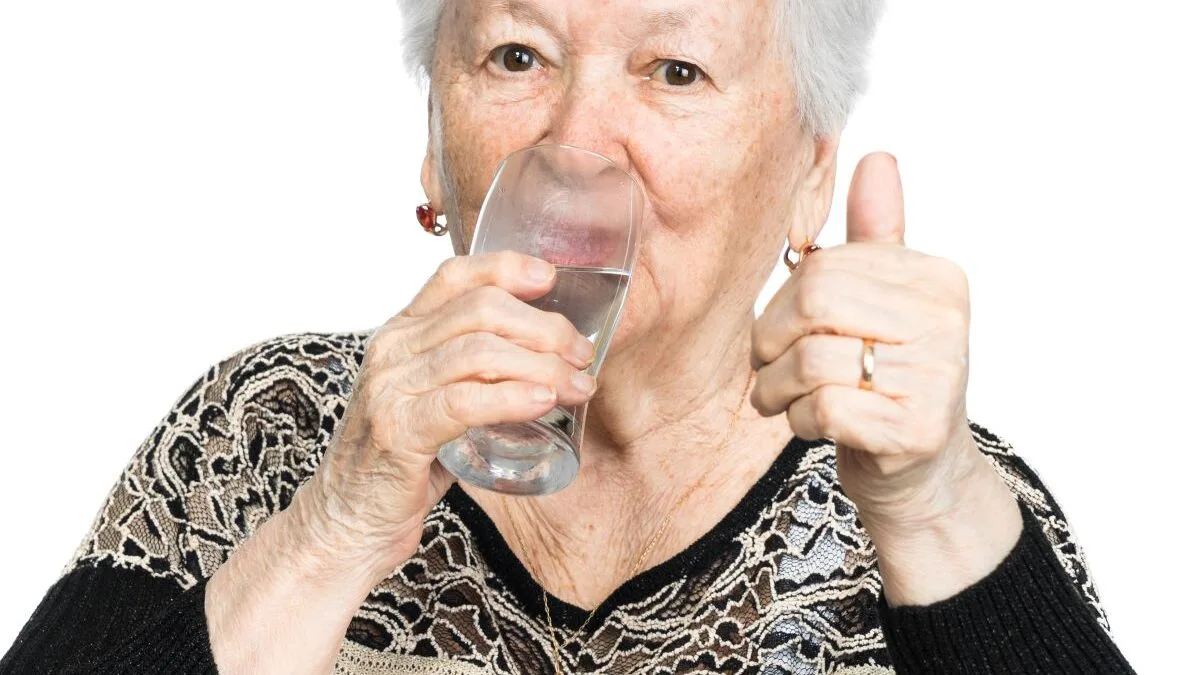
As we age, the kidneys’ ability to retain water decreases. Weakness of the body’s immune system and contracting various chronic diseases have a negative effect on kidney function. Elderly people have low physical activity due to inactivity. This makes them feel less thirsty. For this reason, it is necessary to pay more attention to the elderly’s water and fluid intake, especially during the hot seasons.
What Are the Complications of Dehydration in Elderly?
How long can elderly live without food and water? Can an elderly person die from dehydration? Dehydration in elderly has dangerous consequences and in rare cases can even lead to death. Due to the fact that today we are witnessing the same rare cases, you should pay enough attention to this issue. In addition, medical research and statistics show that dehydration in people’s bodies doubles the risk of stroke. All people may face such a problem if they do not pay attention to this issue, but the elderly are prioritized.
The body must be supplied with enough water, and even small amounts of it can cause problems. For example, we can mention the impact on mental performance, which unfortunately many elderly people experience temporarily or permanently. In conditions of dehydration, a person feels more tired, and this can have a significant impact on brain functions such as memory, attention, reaction capacity, and concentration. If the body is reduced, many physical problems appear in the body of the elderly, some of which we have listed below:
Dehydration in the elderly may cause a severe drop in blood pressure. The less water these people have in their bodies, the more likely they are to develop this disease. If you feel that your elderly person is regularly experiencing problems such as physical weakness, you can give the possibility of dehydration. Following weakness and the need for more food, dizziness will also come to people. Elderly with the problem of lack of water, sometimes lose their balance for no reason.
Skin wounds on the body of these people have various reasons, and dehydration can be one of them. Of course, continuous and regular consumption of water will have a great impact on eliminating all types of wounds. Finally, it should be mentioned that damage and infection of the urinary tract and kidneys, along with constipation, are unfortunately common among many elderly people these days.
Many elderly people think that by not drinking fluids, especially at night, they can deal with the problem of urinary incontinence during sleep, while this is completely wrong. Studies show that not drinking water at night, apart from having many detrimental effects on the body, has no effect on the frequency or severity of nocturnal urinary incontinence. Maybe this question will arise for you that how to manage incontinence in the elderly?
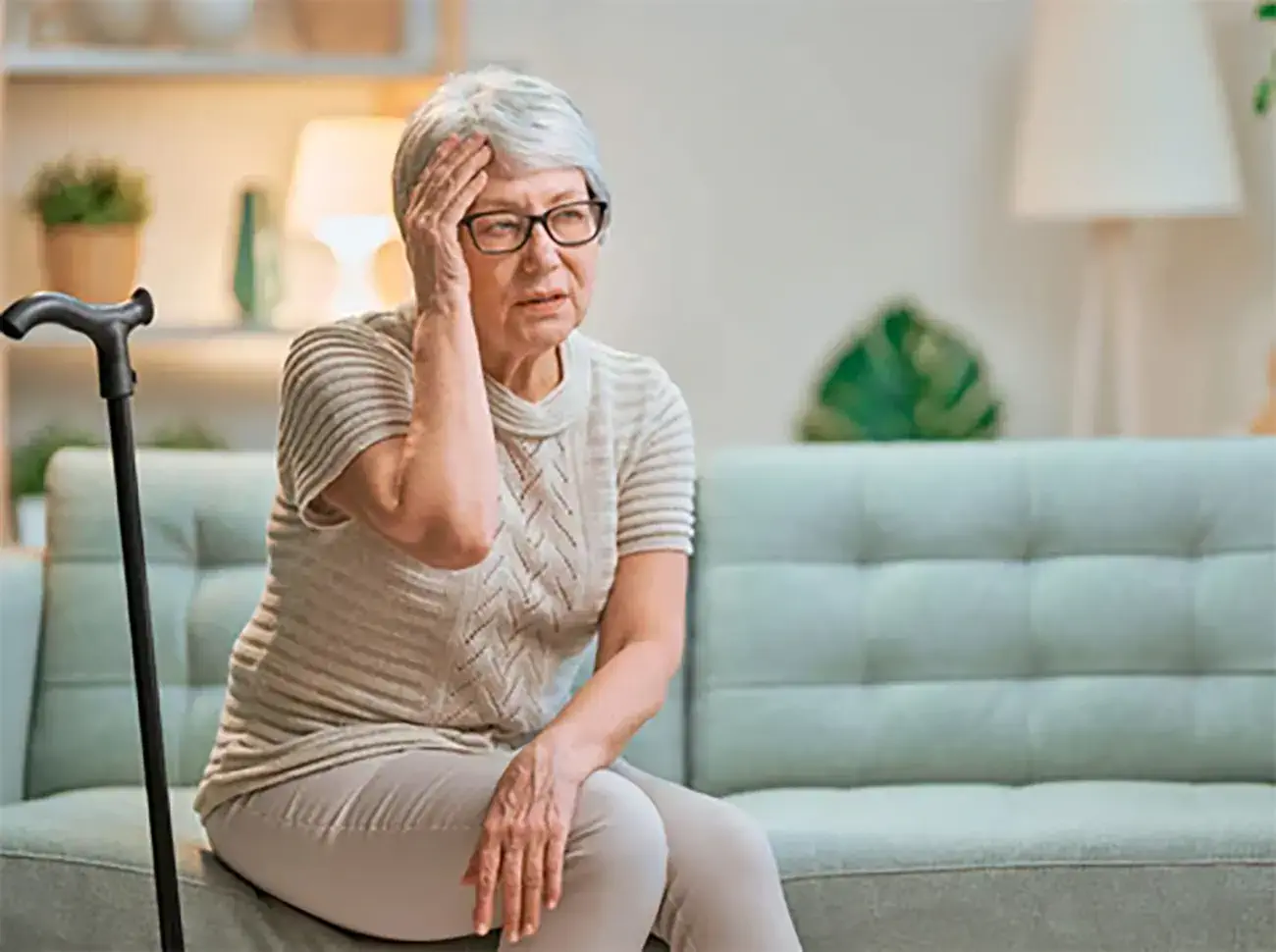
What Are the Symptoms of Dehydration in the Elderly?
what are 10 physical signs to detect severe dehydration in older adults? Keep in mind that dehydration can occur at any age and condition, but children and the elderly are more susceptible to it. The most important symptoms of severe dehydration in seniors are high urine concentration. When the body’s water level is in a balanced state, the urine will be pale yellow and odorless. While if the body’s water level decreases, the urine will be deep yellow and even brown. In addition, it is usually accompanied by a strong odor.
Other important symptoms of dehydration in seniors include sudden and severe diarrhea and vomiting. In this case, the body loses more water and electrolytes, and therefore older people should drink more fluids. Some other prominent early signs of dehydration in the elderly woman and man are:
- Extreme thirst
- Dry mouth and dry skin in the elderly
- Weakness and fatigue
- Dizziness and headache
- Decreased and discolored urine
- Rapid heartbeat and breathing
- Low sweating
- Tiredness
- Sunken eyes
- Muscle cramps
- Loss of skin elasticity (if you see some people still have healthy and youthful skin despite age, it can be due to getting enough water in the body)
Most Common Cause of Dehydration in Elderly
Dehydration in the elderly occurs for various reasons, some of the most important of which are:
- Decreased thirst
- History of strokes
- Impaired kidney function
- Uncontrolled diabetes and swallowing disorders in old age
- Gastrointestinal problems
- Mental illnesses such as Alzheimer’s
- Inability to provide the required water due to inability to move
- Fever
- Psychological and psychiatric illnesses such as Alzheimer’s (for example, the elderly do not know whether they have drunk water or not)
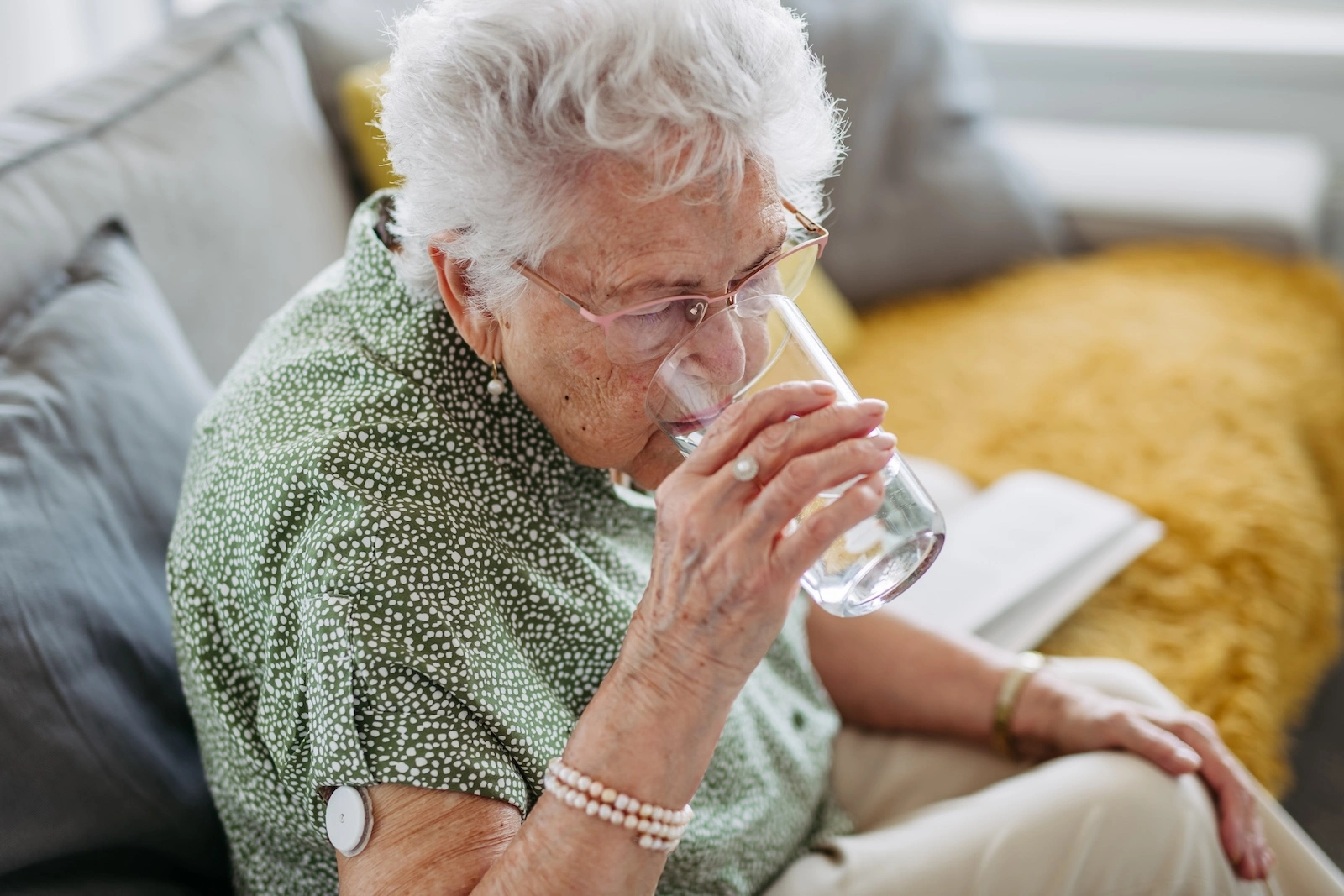
In addition to the reasons we have mentioned so far, other factors can be listed that are effective in reducing the body water of the elderly. The use of certain medications such as Lasix, laxatives and diuretics is one of these cases. In addition, it can be mentioned that the consumption of drinking water around the clock is reduced. This issue is especially serious in elderly people who are faced with urinary incontinence. Nutritional problems can also contribute to dehydration in the elderly.
How Older Adults Can Avoid Dehydration?
If you think your senior is dehydrated and is experiencing some symptoms, it’s not too late and you can prevent it from getting worse. Here are some of the most important prevention tips to help you understand why seniors are dehydrated:
- Try to drink water throughout the day. Sometimes simple reasons like concerns about access to the bathroom, physical inability to drink water, and reluctance to drink can prevent seniors from drinking as much water.
- If you are one of those people who can’t drink a lot of water, it’s a good idea to get it from watery drinks and foods like broth and soup.
- Other drinks that may help with hydration include milk, orange and watermelon juice, coconut water, green and herbal teas, and low-sugar fruit juices.
- Drink coffee and tea in moderation, as they can have diuretic effects and can also bother seniors during the night.
- If it’s difficult to drink fluids all at once, sip fluids in small sips.
- A diet suitable for the elderly should be low in salt and varied. Try to include foods that have a higher water content in your diet.
- Fruits such as cucumbers, watermelons, and oranges contain a lot of water and help keep the body hydrated. Cucumber, celery, and strawberries, are all great for treating dehydration in elderly.
- If water alone is not appealing to your senior, try adding a slice of lemon to make it more flavorful. In the same way, you can make your senior’s water more flavorful and palatable to make it a better drinking experience.
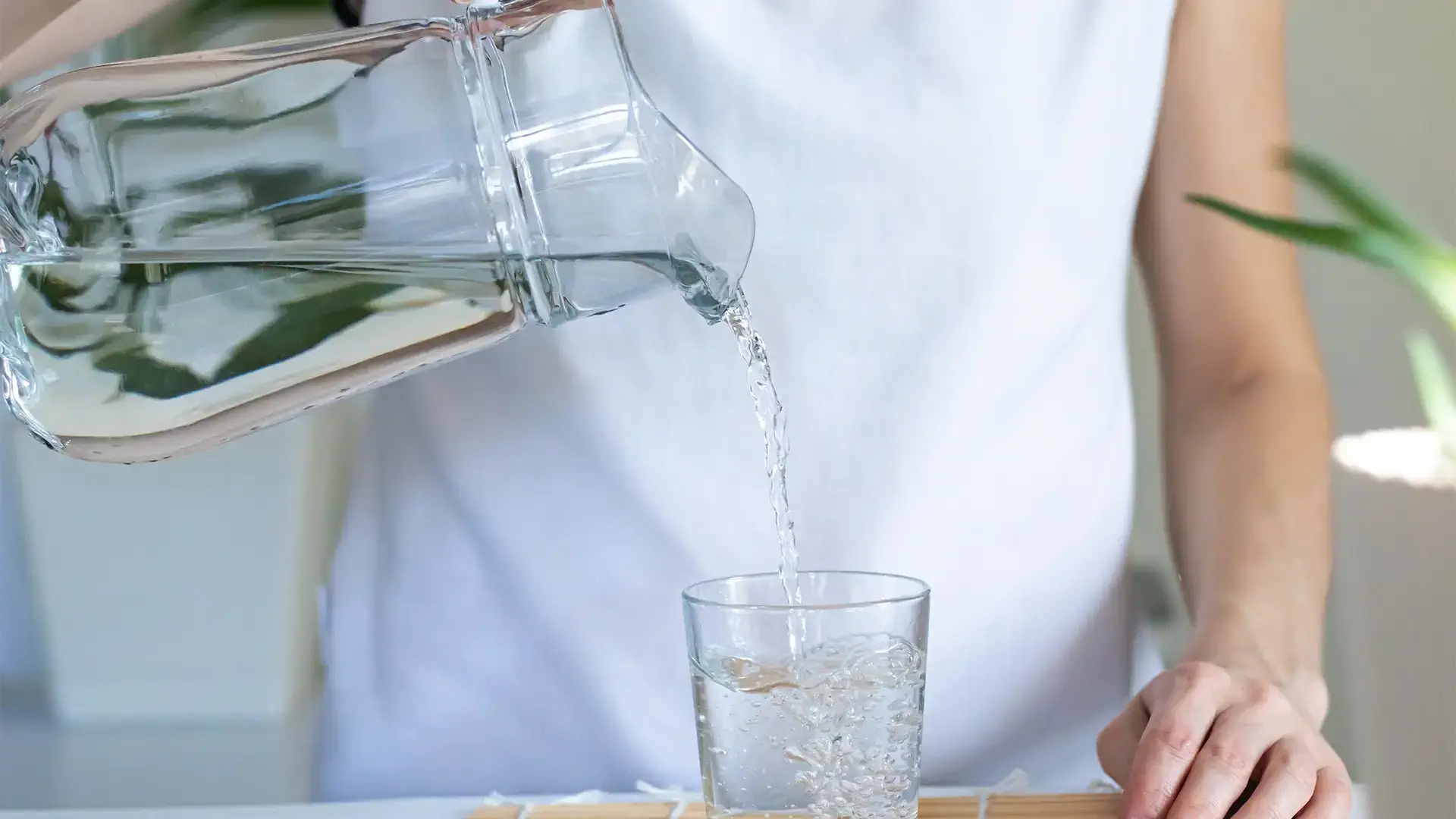
- Many seniors devote part of their day to exercise. If you are one of them and you want to exercise, especially in hot weather or environments, be sure to bring some water with you.
- If you are sick with symptoms such as fever, vomiting, or diarrhea, be sure to drink more fluids than usual.
- If you have an underlying condition, talk to your doctor about your specific fluid and hydration needs.
- Some medications may increase urination, which can cause excess fluid loss. Some examples of medications that can cause increased urination include diuretics and some blood pressure medications.
Treatment for Dehydration in Elderly
The main way to treat mild to moderate dehydration in the elderly is to drink water. Obviously, nothing can replace the lack of water in the elderly like fluids. Encourage the elderly to drink water regularly. When using medications, it is a good opportunity to drink water.
Also, consuming other fluids such as fruit juice, herbal teas, low-salt soups, and watery foods play an effective role in treating and managing dehydration. Make sure your elderly person has good access to water and healthy drinks. For example, it is better to keep a bottle of water near the hand of the elderly.
Sometimes, vomiting or diarrhea can lead to a significant decrease in electrolytes and dehydration. In these situations, drinking drinks that contain electrolytes may be helpful. Examples include sports drinks and Pedialyte.
If dehydration is more severe, hospitalization may be required. In these situations, fluids and electrolytes are administered intravenously.
Concluding Remarks
Older adults are prone to dehydration. There are many reasons for this, including low fluid levels in the body, decreased thirst response, and medications or underlying health conditions. Look for symptoms such as dry mouth, fatigue, dark urine, and lightheadedness. Remind seniors to drink water throughout the day, especially at mealtimes and after exercise.
Keep water in places that are easily accessible. If you are concerned that the senior will not be able to get to the toilet in time, make it easier to reach it after drinking fluids. If you are unsure about your body’s hydration needs, talk to your doctor to find out how much water you should drink daily.

Frequently Asked Questions
How to treat dehydration in elderly at home?
The best way to prevent dehydration in the elderly is to drink 8 glasses of water daily.
What should an elderly person eat to control body fluids?
Drinking water and sugar-free fluids such as herbal teas, as well as eating soup and stews, play a major role in controlling the body’s fluid volume.
Which diseases cause dehydration in the elderly?
Diseases such as cold in the elderly, bronchitis, and bladder infections may aggravate dehydration in the elderly.
What pills should we take for dehydration?
Taking any medication to compensate for dehydration in the elderly should be done under the supervision of a doctor. ORS-EFF boiling solution is a good option to compensate for some of the water lost by the body.
What are the complications of dehydration in elderly?
Low blood pressure, feeling weak and dizzy, loss of balance, skin ulcers, damage and infection in the urinary tract and kidneys, and constipation are among the most common complications of dehydration in the body.
Which medications cause dehydration in elderly?
Laxatives, oral medications for type 2 diabetes (Farxiga, Invokana, Jardiance, etc.), Excedrin (a migraine pill), and chemotherapy drugs for cancer are among the most common medications that cause dehydration.
